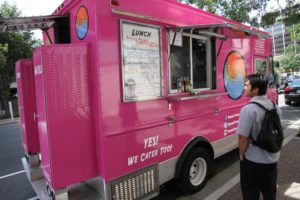 Seoul Food truck co-owner J.P. Goree got a citation and a court date from Arlington County Police on Wednesday.
Seoul Food truck co-owner J.P. Goree got a citation and a court date from Arlington County Police on Wednesday.
His crime: Keeping his Korean cuisine food truck in one Clarendon Courthouse parking spot for longer than the county’s 60-minute limit for mobile food vendors.
“We feel like we’re being treated as a second-class business,” Goree said Friday. “We’re a micro-business, aspiring to be a bigger small business and it seems like that’s something that would be fostered by the community.”
Goree said police told food truck owners a few weeks ago that they would soon start enforcing the regulation. In May, Jill Griffin, a commercial development specialist for Arlington Economic Development, said she had heard enforcing the time limit “has been challenging.”
Griffin also said officials hoped to talk with stakeholders this summer to form recommendations for updating Arlington’s vending ordinance this fall.
“If you open at 11 [a.m.] or 11:30 [a.m.] that hour is only going to get you to when you have the longest line right in the very middle of your lunch rush,” Goree said.
Goree said he thinks ongoing tension between food truck owners and brick-and-mortar restaurant owners is behind Wednesday’s enforcement. Also in May, ARLnow.com obtained an internal document from the Rosslyn Business Improvement District (BID) that said “the number, location and type of operation” of food trucks and carts is “inadequately regulated by Arlington County.”
The Rosslyn BID is funded by the property owners who rent space to the neighborhood’s restaurants, delis and cafes.
The Bada Bing truck also reported receiving a ticket Wednesday on its Twitter page. Ice cream food truck Sinplicity tweeted out a similar message. Goree’s court date is Aug. 21. There was no fine listed on the citation.
“If a truck or a car parks at a metered spot, it can stay there for as long as the meter allows,” said Rob Frommer, an attorney with the Institute For Justice, a Ballston-based libertarian public interest law firm. “It doesn’t make any sense to arbitrarily limit how long one particular type of vehicle can remain in one spot.”
Two years ago, the Institute for Justice began a National Street Vending Initiative to help legalize food trucks and vendors. Frommer said Arlington’s own experience with the growing food truck industry helped inform the organization’s goals.
“It seemed like Arlington was doing a good job of embracing the vendors and letting these businesses start up,” Frommer said. “This change in enforcement is an unfortunate and surprising development.”

